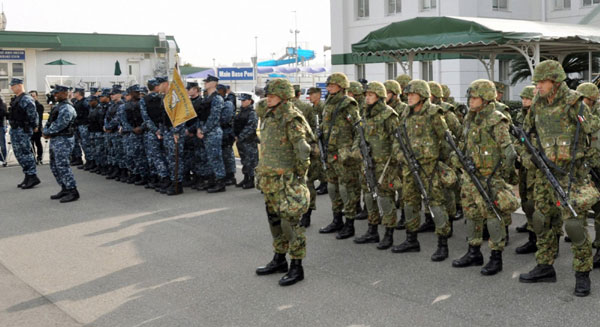Asia-Pacific
Japan, US launch biggest ever joint drill
(Agencies)
Updated: 2010-12-03 10:51
 |
Large Medium Small |
|
 A ceremony is held at the US naval base in Sasebo, southern Japan, to mark the beginning of Japan-US defence exercises Dec 3, 2010. [Photo/Agencies] |
TOKYO – Japan and the United States launched their biggest ever joint military exercise Friday amid tensions on the Korean peninsula, the Japanese defence ministry said.
The "Keen Sword" drills, which mark the 50th anniversary of the Japanese-US alliance, will continue until December 10, officials said.
Around 34,000 Japanese military personnel with 40 warships and 250 aircraft are joining more than 10,000 US counterparts with 20 warships and 150 aircraft in the drill off Japan's southern islands, close to the coast of South Korea.
The manoeuvres include integrated air and missile defence, base security, close air support, live-fire training, maritime defence and search and rescue.
The Pacific allies are for the first time being joined by South Korean military observers, in a bid by Tokyo to demonstrate solidarity among the three countries at a time of high tension in the region.
Japan sent soldiers in an observer capacity to take part in joint US-South Korean military exercises in July, held after the sinking of the Cheonan, a 1,200-tonne South Korean naval vessel, the Japanese defence ministry said.
The joint manoeuvres will be much bigger than a naval exercise staged by Washington and Seoul this week in a show of force.
Japan relies heavily on the United States for its security as under its pacifist constitution, its military is not allowed to attack enemy territories.
"At present, there are already enough of these kinds of military exercises. Under the present conditions, all relevant parties ought to do more to benefit the maintenance of peace and stability on the Korean peninsula and in the region, and not the opposite," said Chinese Foreign Ministry spokeswoman Jiang Yu.
Jiang Yu said at a regular press conference Thursday that military alliances and displays of force cannot solve the Korean Peninsula issue and the US-Japan alliance should not damage the interests of third parties including China.
"The international community does not support actions that escalate tensions and the parties involved should keep calm and exercise restraint and settle disputes peacefully through dialogue and consultation." Jiang said.



